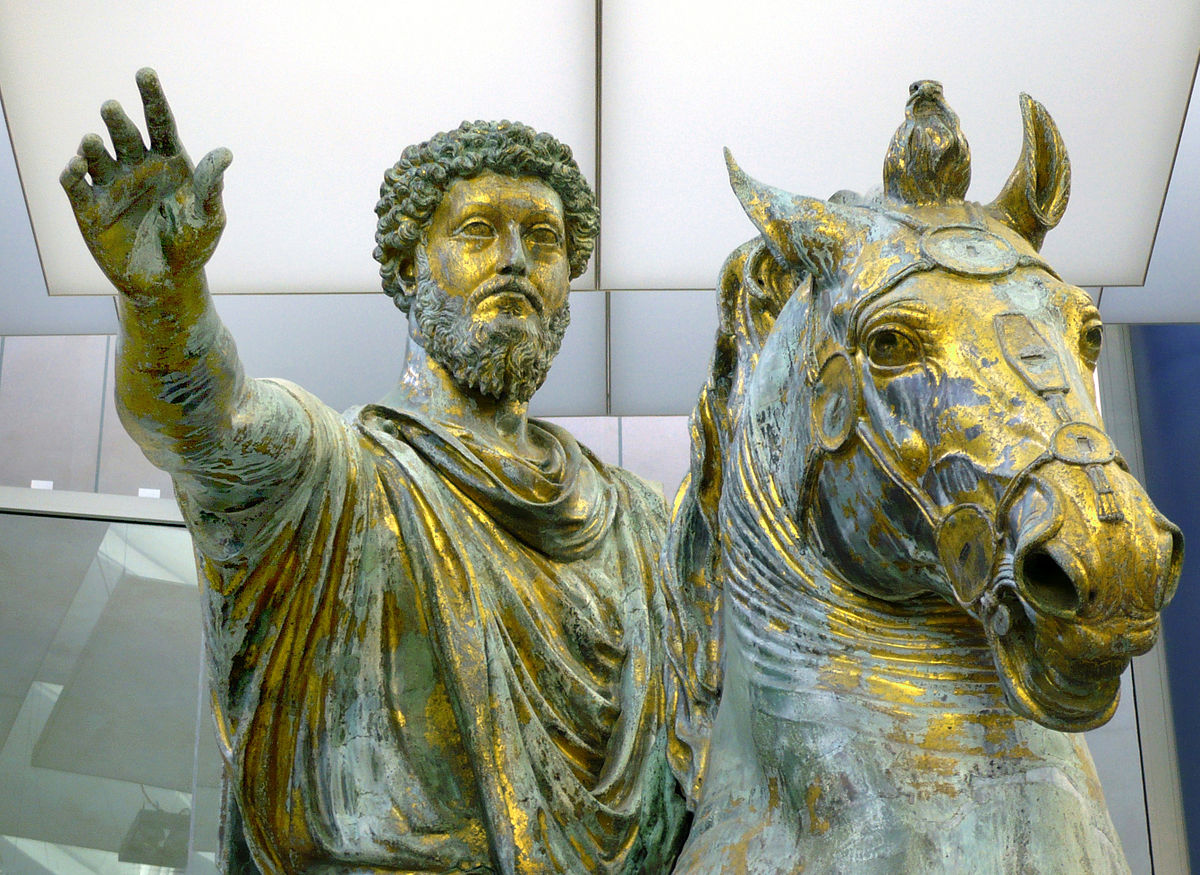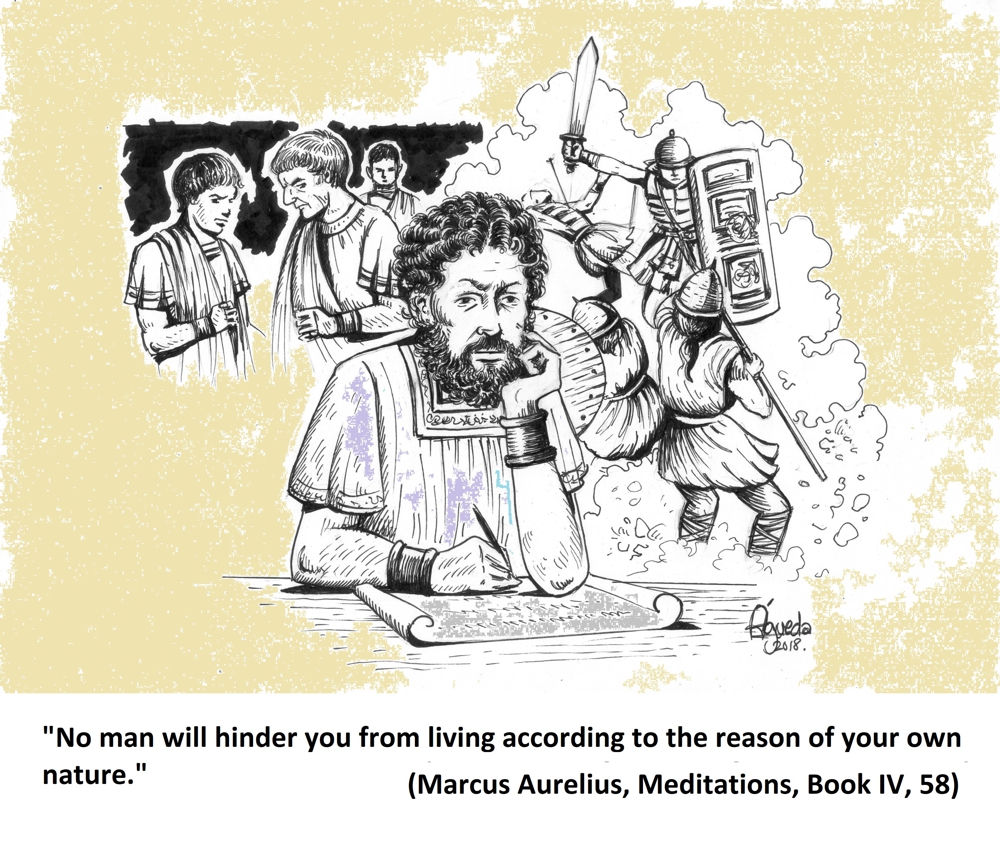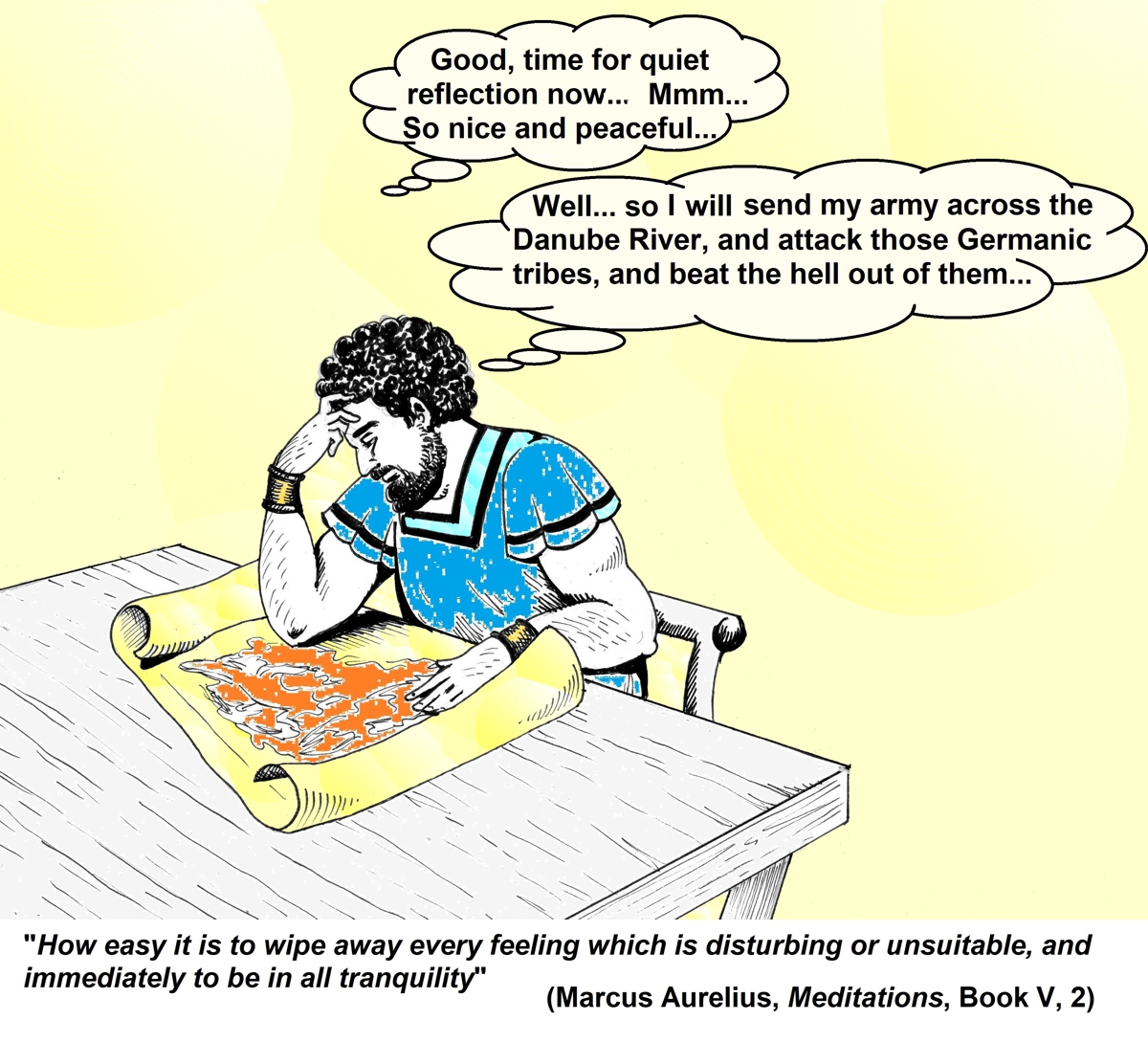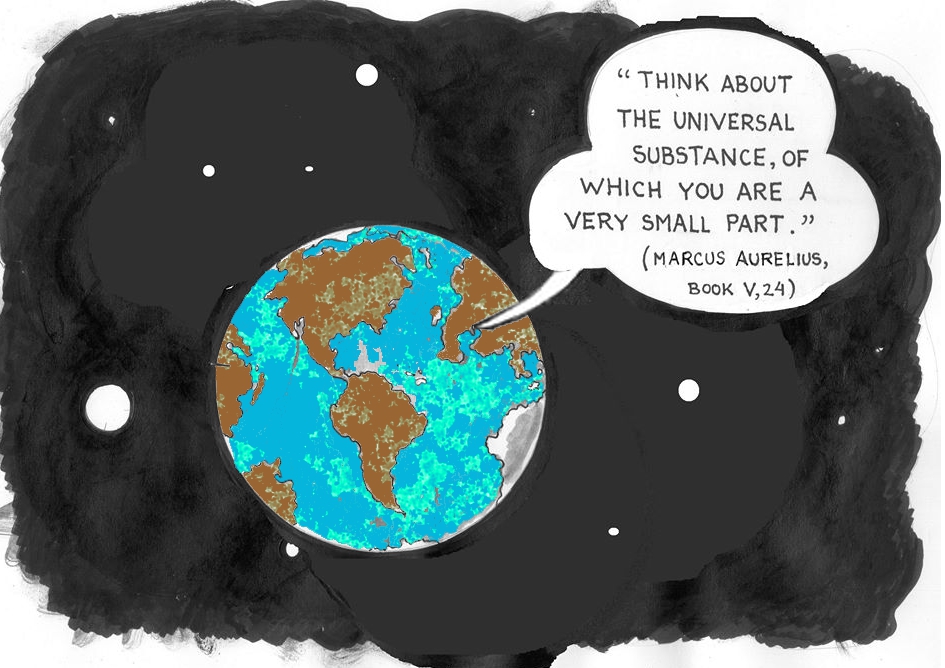The Philo-Practice Agora
The electronic library for philosophical practitioners from around the world
LIST OF PHILOSOPHERS
|
|
THEMES ON THIS PAGE:
| 1. HARMONY WITH NATURE | 2. INNER PEACE | 3. SELF-REFLECTION | 4. TIME AND CHANGE | 5. THE REAL SELF |

Marcus Aurelius (121-180 AD) was a Philosopher and a Roman emperor from the Stoic school of philosophy. As a Stoic, he emphasized the importance of maintaining inner peace, accepting fate calmly, moral and rational behavior, freedom from the power of emotions, and being in harmony with the cosmos.
Marcus was born in Rome to a rich aristocratic family, and was educated at home. After being adopted by the previous emperor, and filling several important political positions, he became emperor of Rome in the year 161, at the age of 40 (at first a co-emperor with Lucius Verus, and about 8 years later the sole emperor). During his time, Rome experienced several attacks and rebellions, and Marcus spent much of his time in the battle-field. Nevertheless, he gained the historical reputation of a good emperor who promoted stability, prosperity, and organization. He died in Vindobona (now Vienna), at the age of 58.
The texts below are all from Marcus Aurelius' book Meditations. This was a personal notebook in which he wrote his daily personal reflections. For this reason, the book has no order or development. The book is divided to twelve “books” (or chapters), some of them written in military camps. Each “Book” consists of short passages, as short as one sentence or as long as one page. The passages in each book have been numbered by modern translators, so different translations use different numbering.
| 1. HARMONY WITH NATURE |

A central principle for Marcus Aurelius is that the universe is a harmonious whole. Everything that happens in it, is good for the function of the whole. Even death and sickness, although they seem bad for a specific person, are good for the general order. Therefore, we must try to live according to our nature, in harmony with society and the world. Furthermore, we must remember that we are part of the universe, in order to appreciate everything that happens to us, and not to fall into sadness or frustration. This is why Marcus Aurelius keeps reminding himself, again and again throughout the book, to remember that he is a small part of the cosmos.
BOOK IV, 23
Everything harmonizes with me, which is harmonious to you, Oh Universe. Nothing for me is too early or too late, if it is on-time for you. Everything which your seasons bring is a fruit to me, Oh Nature. All things are from you, all things are in you, to you all things return.
BOOK V, 3
Judge every word and act that are according to nature to be right for you. And don’t be diverted by people’s criticism, but if something is good to be done or said, don’t consider it unworthy of you. Because those persons have their own peculiar guiding principle and follow their own peculiar movement, which are not things that you regard. Rather, go straight on, following your own nature and the common nature – both of them have the same way.
BOOK IV, 58
No man will hinder you from living according to the reason of your own nature. Nothing will happen to you contrary to the reason of the universal nature.
BOOK VI, 8
All things are related to one another, and the bond is holy, and there is hardly anything unconnected with any other thing. Because things are coordinated together, and they combine to form the same ordered universe. Because there is one universe that consists of all things, and one God who pervades all things, and one substance, and one law, one common reason in all intelligent animals, and one truth.
BOOK VIII, 54
Don’t only let your breathing act in harmony with the air that surrounds you, but also let your intelligence be in harmony with the intelligence that embraces all things. Because the intelligent power is diffused everywhere and in all things for a person who is willing to take it in, no less than the air-power for a person who is able to breath it.
BOOK X, 6
Whether the universe is a domain of atoms, or nature is a system, let this first be established: that I am part of the whole which is governed by nature. Next, I am intimately related to the parts which are of the same kind as my kind [= who are humans like me]. Because whenever I remember this, I will be not be dissatisfied with any of the things that are given to me out of the whole. Because nothing is damaging to the part, if it is beneficial to the whole. […]
By remembering that I am a part of such a whole, I will be content with everything that happens. And given that I am intimately related to the parts that are of the same kind as me, I will do nothing anti-social, but I will direct myself to the things that are of my kind [=humans like me], and I will turn all my efforts to the common interest, and divert them from the contrary. Now, if I do so, then life must flow happily, just as a citizen’s life is happy when he follows the way that is helpful to his fellow-citizens, and he is content with whatever the state may assign to him. InnerPeace
| 2. INNER PEACE |

In accordance with Stoic principles, Marcus Aurelius reminds himself (and us) to maintain inner peace, a focused mind on one’s goals and duties, and complete acceptance of anything that happens. This means maintaining tranquility even in the face of danger, disaster, sickness, and death. Emotional reactions such as fear, frustration, anger, anxiety, and jealousy go against Reason. You should do what you have to do, and keep your mind free and peaceful. The Stoics believed that we have the power to free ourselves from our emotional needs and automatic reactions, but this requires practice and exercises. Marcus Aurelius MEDITATIONS is indeed a personal exercise book.
BOOK IV, 26
Have you seen those things? Look also at these. Do not disturb yourself. Make yourself all simplicity. Is somebody doing something wrong? It is to himself that he is doing the wrong thing. Has anything happened to you? Well, everything that happens to you is determined by the universe from the beginning. In a word, your life is short. You must use reason and justice to use profitably the present situation. Be sober in your relaxation.
BOOK IV, 51
Always choose the short way, and the short way is the natural. Say and do everything according to the best reason. Because this intention frees a man from trouble, and conflict, and all pretense and show-off.
BOOK V, 2
How easy it is to resist and to wipe away every feeling which is disturbing or unsuitable, and immediately to be in all tranquility.
BOOK V, 25
Does somebody do me wrong? Let him worry about it. He has his own disposition, his own activity. I have what the universal nature wants me to have, and I do what my nature now wants me to do.
BOOK V, 28
Are you angry with him because his arm-pits stink? Are you angry with the person because his mouth smells bad? What good will this anger do to you? He has such a mouth, he has such arm-pits. It is necessary that such a smell must come from such things. “But the man has reason,” it can be said, “and he can, if he tries, discover that it bothers other people!” Well then, and you have reason too. With your rational faculty stimulate his rational faculty, show him his error, rebuke him. If he listens, you will cure him, and there is no need to be angry.
BOOK VI, 11
When the circumstances force you to be disturbed, quickly return to yourself and do not continue to be out of tune longer than the compulsion lasts. Because you will have more mastery over the harmony by continually following it.
BOOK VI, 22
I do my duty. Other things do not trouble me, because they are either things without life, or things without reason, or things that stray and do not know the way.
BOOK VII, 54
Everywhere and at all times it is in your power to fully accept your present condition, and to behave justly towards those who are around you, and to apply your skill to your thoughts so that nothing will enter into them before you first examine them.
BOOK VIII, 5
This is the main thing: Don’t be disturbed, because all things are according to the nature of the universe, and soon you will be nobody and nowhere, like Hadrian and Augustus [who are dead]. Then, after fixing your eyes steadily on your business, look at it, and at the same time remember that it is your duty to be a good man, and remember what human nature demands. And do this without turning aside. And speak as it seems to you most proper, only with good temper, and with modesty, and without hypocrisy.
BOOK VIII, 51
Suppose that men kill you, cut you in pieces, curse you. What can these things do to prevent your mind from remaining pure, wise, sober, just? For instance, if a man stands by a clear pure spring, and curses it, the spring will not stop sending out drinkable water. And if he throws mud or dirt into it, it will quickly scatter it and wash it out, and will not be dirty anymore. How, then, will you possess a perpetual fountain, and not just a water-well? By continuously forming yourself with freedom together with satisfaction, simplicity, and modesty.
| 3. SELF-REFLECTION |
 Most of Marcus Aurelius’ passages in his book Meditations are exercises of reflecting on the universe, on reason, death, change, justice, and life in general. Many of these exercises involve self-reflection: Examining your own mind, your own opinions, emotions, behavior.
Most of Marcus Aurelius’ passages in his book Meditations are exercises of reflecting on the universe, on reason, death, change, justice, and life in general. Many of these exercises involve self-reflection: Examining your own mind, your own opinions, emotions, behavior.
BOOK II, 8
A person rarely becomes unhappy because he doesn’t observe what is in the mind of somebody else. But those who do not observe the movements of their own minds, must necessarily be unhappy.
BOOK IV, 3
People seek retreats for themselves: houses in the country, sea-shores, and mountains. And you, too, tend to desire such things very much. But this is a mark of the most common kind of people. Because it is in your power to retire, whenever you choose, into yourself. Because nowhere can a man retire with more peace, or with more freedom from trouble, than into his own soul, especially when he has within him thoughts that by looking into them he is immediately in perfect tranquility. And I affirm that tranquility is nothing else than the good ordering of the mind.
Therefore, constantly give this retreat to yourself, and renew yourself. And let your principles be brief and fundamental, so that when you return to them they will immediately purify the soul completely, and send you back free from all dissatisfaction about the things to which you are returning.
Because, what are you dissatisfied with? With the badness of people? Remember that rational animals exist for each other, and that to endure is part of justice, and that people do wrong involuntarily. And consider how many people – after mutual animosity, suspicion, hatred, and fighting – have died and were reduced to ashes. And be quiet at last! But perhaps you are dissatisfied with what was given to you out of the universe? […] Remember the arguments that proved that the world is a kind of political community. And be quiet at last!
[…]
This then remains: Remember to retire into your own little territory, and above all do not distract or pressure yourself, but be free, and look at things as a man, as a human being, as a citizen, as a mortal. But among the things which you will consider, let there be these two: First, that things do not touch the soul, because they are external to it, but our worries come only from our opinions about them. Second, that all these things that you see change immediately and will no longer be. And constantly keep in mind how many of these changes you have already witnessed. The universe is transformation; life is opinion.
BOOK V, 24
Think about the universal substance, of which you are a very small part; and about universal time, from which you have been given a short and indivisible interval; and about what is fixed by destiny; and what a small part of all this you are.
BOOK VII, 59
Look inside yourself. Inside is the fountain of good, and it will always bubble up, if you will always dig.
| 4. TIME AND CHANGE |
 Throughout his book, Marcus Aurelius reminds himself how short life is, and how everything dies or disappears in time. This helps him see the broader perspective on life and the universe. Fame, riches, relatives and family, a person’s life – all of these are temporary, a little blip in history that will soon disappear from the universe and from human memory. When you see the bigger perspective, you stop worrying about trivial things, and you realize what is really important.
Throughout his book, Marcus Aurelius reminds himself how short life is, and how everything dies or disappears in time. This helps him see the broader perspective on life and the universe. Fame, riches, relatives and family, a person’s life – all of these are temporary, a little blip in history that will soon disappear from the universe and from human memory. When you see the bigger perspective, you stop worrying about trivial things, and you realize what is really important.
Notice that Marcus Aurelius is not cynical about life. On the contrary, he is saying that our role is to perfect the little moment of life that was given to us: Cultivate your inner peace and harmony, act without fear rationally according to universal reason, and treat your fellow human beings with fairness and understanding.
BOOK II, 12
How quickly all things disappear, in the universe – the bodies themselves, and in time – the memory of them. What is the nature of all material things, and particularly those which tempt us with pleasure or terrify us with pain, or those that are noisily presented by momentary fame. How worthless, and contemptible, and vulgar, and perishable, and dead they are – this is the role of the intellectual faculty to observe.
BOOK II, 14
These two things then you must keep in mind: First, that all things from eternity are of similar forms and return in a cycle, and that it makes no difference whether a man will see the same things during a hundred years or two hundred, or an infinite time. And second, that a person who will live the longest life and a person who will die very soon, both of them will lose exactly the same. Because the present-time is the only thing which can be taken away from a person, since this is the only thing which he has, and a person cannot lose something which he doesn’t have.
BOOK III, 10
Throw away all things, and keep only those which are few. And keep in mind that every man lives only this present time, which is an indivisible point, and that all the rest of his life has either passed already, or is uncertain. Short is the time which every man lives, and small is the corner of the earth where he lives. And short, too, is the longest posthumous fame, and even this fame continues only through a series of poor human beings who will very soon die, and who don’t know even themselves, much less do they know somebody who died long ago.
BOOK IV, 43
Time is like a river made up of the events which happen, and a violent stream. As soon as a thing appears, it is carried away, and another thing comes in its place, and it will be carried away too.
BOOK IV, 44
Everything that happens is familiar and well-known, just like the rose in spring and the fruit in summer. This includes disease, and death, and scandal, and treachery, and whatever else delights foolish people or annoys them.
BOOK IV, 47
If any god told you that you will die tomorrow, or the day after tomorrow, you wouldn’t care much whether it will be on the third day or tomorrow, unless you were in a very mean mood, because how small is the difference!? Therefore, you should consider it as no great thing to die after many years rather than tomorrow.
BOOK V, 23
Think often about the speed in which things pass by and disappear, both the things that are, and the things that are produced. Because the material world is like a river in a never-ending flow, and the activities of things are in a constant change, and the causes work in infinite varieties, and there is almost nothing that stands still. And consider what is so near to you: this endless abyss of the past and of the future, in which all things disappear. How, then, isn’t it foolish to be proud about such things or overwhelmed by them and makes oneself miserable? Because they disturb oneself only for a time, and a short time.
BOOK VII, 25
Nature which governs the whole will soon change all the things which you see, and out of their substance it will make other things, and again other things from the substance of them, in order that the world may be always new.
BOOK IX, 33
All that you see will quickly die, and those who have seen this dissolution will very soon die too. And the person who dies at a very old age will end up in the same condition as the person who died prematurely.
When you subscribe to the blog, we will send you an e-mail when there are new updates on the site so you wouldn't miss them.
